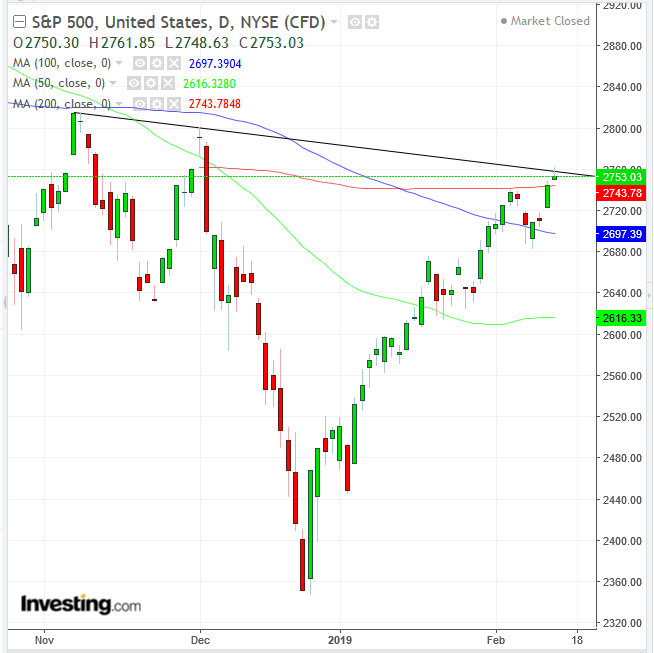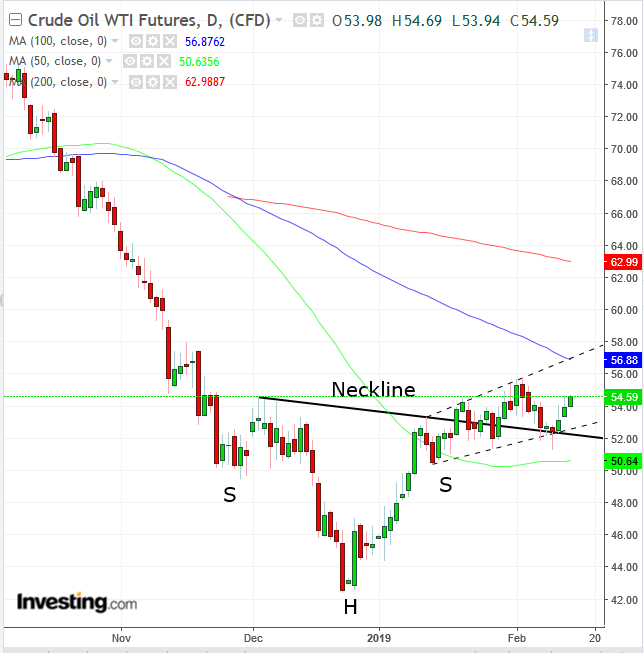- European shares, U.S. futures climb on reports of U.S.-China progress, possible tariff deadline delay
- Oil keeps rallying as Saudi, Venezuela supply cuts offset growing stockpiles
- Euro, dollar waver; Pound slips ahead of vote on amended Brexit proposal
Key Events
European stocks and futures on the S&P 500, Dow and NASDAQ 100 kept inching higher this morning—though U.S. contracts hit a resistance level—after a report that the Trump Administration is considering postponing by 60 days the March tariff deadline that would hike duties on $200bn worth of Chinese exports to 25 percent. Earlier, the U.S. president told reporters that trade negotiations are making satisfactory progress, helping steady investor sentiment.
The Stoxx Europe 600 climbed higher helped by gain in industrial goods and food shares. Despite a forceful post-Christmas rally, the previous volatility carried long-lasting effects on markets, as Credit Suisse (SIX:CSGN) (-0.33%) reported that losses from its trading operations erased wealth-management gains. British multinational biopharmaceutical group AstraZeneca (LON:AZN) jumped over 4.5% after forecasting expanded earnings for the year, while shares of Airbus (PA:AIR) soared over 5% after the French aircraft producer discarded its A380 Superjumbo.
Earlier, in the Asian session, equities traded within a holding pattern, as investors nervously awaited the outcome of high-level U.S.-China negotiations in Beijing. Economic data showed trade between the two countries has plunged, re-igniting fears over the hefty economic impact of the trade war.
China’s Shanghai Composite slipped 0.05 %, after posting a doji below the 200 DMA, with overbought MACD and RSI, which is curving down, while Hong Kong’s Hang Seng edged 0.23% lower. Japan’s Nikkei 225 was flat, which is viewed negatively considering that preliminary data showed that the country's economy grew by 1.4% in 2018’s fourth quarter, boosted by strong domestic demand—a favorable indicator given Japanese consumers' typical saving-oriented mentality.
South Korea’s KOSPI (+1.11%) outperformed by far its regional peers, reflecting the outstanding growth rate of this Asian economy, with economists expecting the country will turn into a global leader in the long run.
Global Financial Affairs
In yesterday’s U.S. session, a positive trade outlook offset some concerns over tax plans, by Florida's Republican Senator Marco Rubio, to disincentivize companies' stock buybacks. Reports of the proposal slowed down gains in the stock market, which nevertheless managed to seal a rally for the fourth straight session.

The S&P 500 advanced 0.3%, with all sectors except Utilities (-0.29%) closing in the green. Energy (+1.25) was the clear out-performer, tracking oil prices in a second day rally to the highest price in a week. Communication Services (+0.07%) was weighed down by Netflix (NASDAQ:NFLX) stock (-2.28%), which sold off after Apple (NASDAQ:AAPL) excluded Netflix products from its new video service, offsetting the positive effect of the media company's positive long-term growth.
Technically, the small daily price range with even smaller closing advance formed a shooting star, whose bearish implication stems from a failed rally. While it marks the second day that the price remains above the 200 DMA, its weakness strengthens the view of a decline back below the single most watched technical indicator, by technicians and non-technicians alike. Its bearish bent is reinforced by the price crossing the downtrend line since Nov. 7 on an intraday level, but ultimately closing below it.
The Dow Jones closed 0.46% higher while the Russell 2000 climbed 0.29%.
Meanwhile, the yield on 10-year Treasurys held close to 2.70 percent. European sovereign bonds were steady, and the euro was flat after data showed Germany’s economy warded off recession risks, though it stagnated in the fourth quarter. The single currency gained some ground later in the European morning.
The dollar also crossed above neutral levels after paring yesterday’s gains.
Gold edged lower for the second day. While gold already reached our target, we expect it to trade higher yet.
The pound also turned lower for the second day ahead of a new round of votes on Prime Minister Theresa May’s Brexit strategy.

Conversely, oil continued its rebound as falling shipments from Saudi Arabia and Venezuela outweighed gains in U.S. crude stockpiles, thereby perpetuating a Head & Shoulders bottom since November. Deeper supply cuts from the Saudis are raising questions as to whether the Middle Eastern country is once again looking to become a swing producer and act on its own to control the oil price balance in the longer term.
Up Ahead
- NVIDIA (NASDAQ:NVDA) is due to release corporate results on Thursday after market close, with a $0.53 EPS, heavily below the $1.57 posted last year. Analysts are expecting the company will remain under pressure until at least July.
- Eurozone fourth-quarter GDP data is set to be released on Thursday, with growth forecast to remain steady at 1.2 percent.
- Also today, The U.S. will report PPI data.
- Steven Mnuchin and Robert Lighthizer are in Beijing for high-level talks, and will meet China President Xi Jinping on Friday, the South China Morning Post reported.
- The U.K. Parliament votes on an amended Brexit draft today, ahead of the March 29 final deadline.
- On Friday, U.S. Congress is due to vote on legislation to avert another partial government shutdown.
Market Moves
Stocks
- The Stoxx Europe 600 gained 0.4 percent.
- Futures on the S&P 500 rose 0.3 percent.
- The MSCI World Index of developed countries climbed less than 0.05 percent to the highest in more than 10 weeks.
- The MSCI Asia Pacific Index fell 0.1 percent.
Currencies
- The Dollar Index was flat.
- The euro rose 0.1 percent to $1.1268.
- The British pound fell less than 0.05 percent to $1.2845.
- The Australian dollar edged 0.4 percent higher to the strongest in more than a week.
- The Japanese yen slid 0.1 percent to the weakest in seven weeks.
- The onshore yuan slipped 0.1 percent to 6.769 per dollar.
Bonds
- The yield on 10-year Treasuries fell less than one basis point to 2.70 percent.
- Germany’s 10-year yield was unchanged at 0.12 percent.
- Italy’s 10-year yield increased less than one basis point to 2.785 percent.
Commodities
- Gold dropped almost 0.2 percent to $1,306.37 an ounce.
- West Texas Intermediate crude rose 1.1 percent to $54.47 a barrel.
- LME nickel rose 0.2 percent to $12,435 per metric ton, the first advance in a week.
- LME copper gained 0.7 percent to $6,166.50 per metric ton, the largest rise in more than a week.
